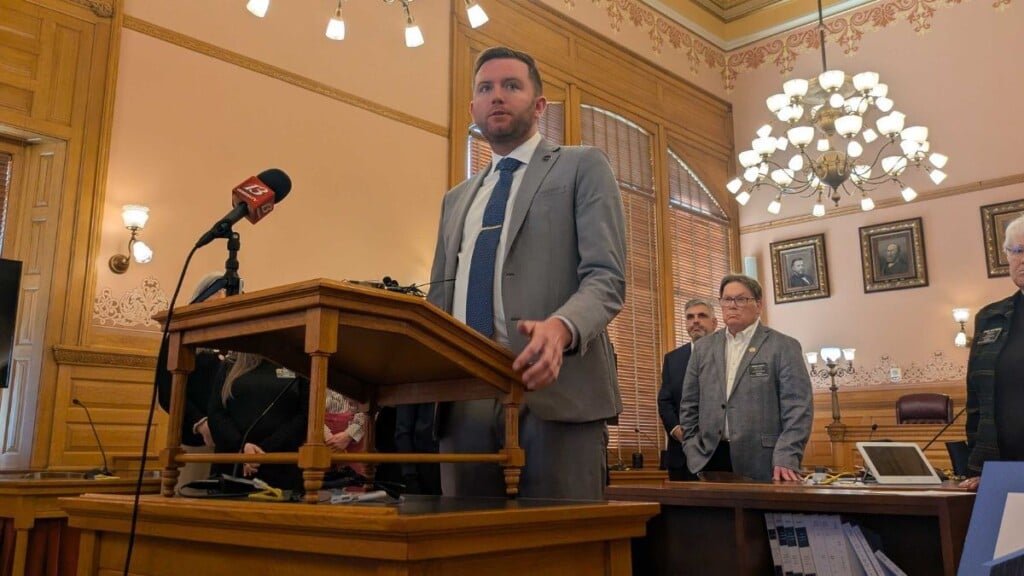Fresh off Obama ’08, Spark Bookhart goes to bat for the school board

Spark Bookhart worked on President Barack Obama’s campaign in Missouri. After the election, Bookhart spent time in Chicago, assisting the transition and pondering his next move. “I knew whatever it was, it had to be bold and audacious,” he tells me.
Objective fulfilled. Upon his return to Kansas City, Bookhart decided that one of the city’s most reviled institutions needed to be preserved.
Bookhart runs a campaign called Hands Off the Kansas City School District. It’s an effort to protect the current governance structure from state lawmakers and others who think a locally elected school board is worthless in practice, though democratic in principle.
The idea, Bookhart says, crystallized last December, when he read a newspaper story that described state Rep. Jonas Hughes’ openness to the idea of moving to an appointed board. Bookhart says the notion seemed ridiculous.
“We don’t appoint state representatives,” he says. “We don’t appoint state senators. We don’t appoint congressmen and senators. We don’t appoint mayors and City Council people. It’s just a democratic principle we’re standing on.”
Insistent that he’s not merely defending the status quo, Bookhart does not deny that the rapidly shrinking, inadequately performing school district has problems. “But fixing the issues is not as simple a matter as changing the governance from a democratically elected one to an undemocratic one,” he says. “No, how we solve the problems in this district is by widespread community engagement — everybody being involved in the process.”
Bookhart brings an interesting résumé to the cause. He grew up in Los Angeles and attended college in the Deep South. He is surely the only man in the city to have worked on the narcotics squad of the Kansas City, Missouri, Police Department and at the Economic Development Corporation, a city-funded agency that administers tax incentives.
The city needs the involvement of younger citizens (Bookhart is in his mid-30s) with rhetorical skills and rich experiences. But the Kansas City, Missouri, School Board? Man, that’s a tough sell.
“I’m not protecting the board,” Bookhart says as we sit on the patio of a restaurant on West 39th Street. “I’m protecting democracy. The status quo is disengagement.”
Bookhart holds an orientation session every Saturday afternoon at Brush Creek Community Center. As he tells it, the district’s woes don’t begin with its barely accountable, easily distracted school board. The real culprit is a lack of knowledge and involvement.
It’s true, as Bookhart says, that the average resident doesn’t know the first thing about the desegregation-monitoring committee and other profound influences on the district. But is more “engagement” a meaningful solution?
For a minute, forget test scores, dropout rates and the endless superintendent searches. Let’s look at the school district simply as an exercise in democracy.
Eight of the nine current board members ran unopposed or were appointed to their positions. Not that contested elections shine as examples of representative government. In 2002, two of the three at-large seats on the board came up for election. A scintillating 9 percent of registered voters cast ballots.
Bookhart draws a line from the minuscule turnout and other manifestations of apathy to the systematic way the school district has been broken over the past 30 years. “That’s an era that’s gone by,” he says. “We have a new era of engagement, a new era of people being excited about the future and creating world-class schools.”
I’m not sure this is true — or if it even matters.
Last year, I attended an open house that the board held at Manual Career Tech Center. I was struck by how inaccessible K-12 education has become to the nonbureaucrat. Parts of the discussion — talk of MSIP and AYP — required a translator.
The acronyms (Missouri School Improvement Program and Adequate Yearly Progress, for those scoring at home) testify to the curious way that primary and secondary education evolved in this country.
The Kansas City School District gets about half of its revenue from property taxes — a legacy of the one-room schoolhouse from our frontier days. Inequities in the system developed as wealth migrated to the suburbs. So states, usually facing court orders, began to provide more assistance to poorer communities.
States also set rules, hence accountability efforts such as MSIP. On top of that, the federal government has expanded its role in education (No Child Left Behind, etc.).
“Local control,” then, is a striking exaggeration or an outright delusion. Principals aren’t educators; they are, as Matt Miller, author of the recent book The Tyranny of Dead Ideas, puts it, “compliance machines, making sure that federal, state, and district programs are legally administered.” Studies indicate that U.S. schools are less autonomous than schools in countries where education is nationalized.
Of course, people can get involved without knowing how adequate yearly progress is measured. As Bookhart says, “Any parent can go into a school and volunteer.”
But creating real change? Good luck. Even from the inside, schools are virtually unmanageable. Miller quotes a former superintendent who worked on education issues at the Bill and Melinda Gates Foundation. “The job [of a school board member] has become more difficult, more complicated and more political,” he says, “and as a result, it’s driven out many of the good candidates that no longer want to put in the time or suffer the sort of brain damage, the personal insult that comes with the job.”
Indifference, in the end, turns out to be an intellectually and emotionally healthy response. Seems to me, kids need two things in order to achieve: a decent home and good teachers. Everything else is just noise.
Bookhart says education would have become his emphasis regardless of the threat to the school board’s authority. The Hands Off campaign will find a new name once the legislative session in Jefferson City ends, he says.
Bookhart says he’s not attached to any personality on the board. It’s pretty easy, however, to link him to an existing power structure.
Ajamu Webster leads a task force that manages the district’s Afrikan Centered Education Collegium Campus. He has opposed past efforts to change the governance of the district. In fact, Marilyn Simmons, the president of the school board, works at his engineering company, DuBois Consultants.
Bookhart’s link to Webster is through the New Tools initiative, an effort driven by Mayor Mark Funkhouser to increase economic activity in distressed areas. Webster serves as the co-chairman of New Tools, which received $150,000 in city funding. Bookhart also serves on the New Tools committee
In our conversation, I tried to get Bookhart to elaborate on the notion of “engagement.” It’s great and all. But what makes it happen? “Engagement happens because of relationships,” Bookhart said.
And in this instance, the relationships lead to people for whom the status quo works pretty well.
Click here to write a letter to the editor.




